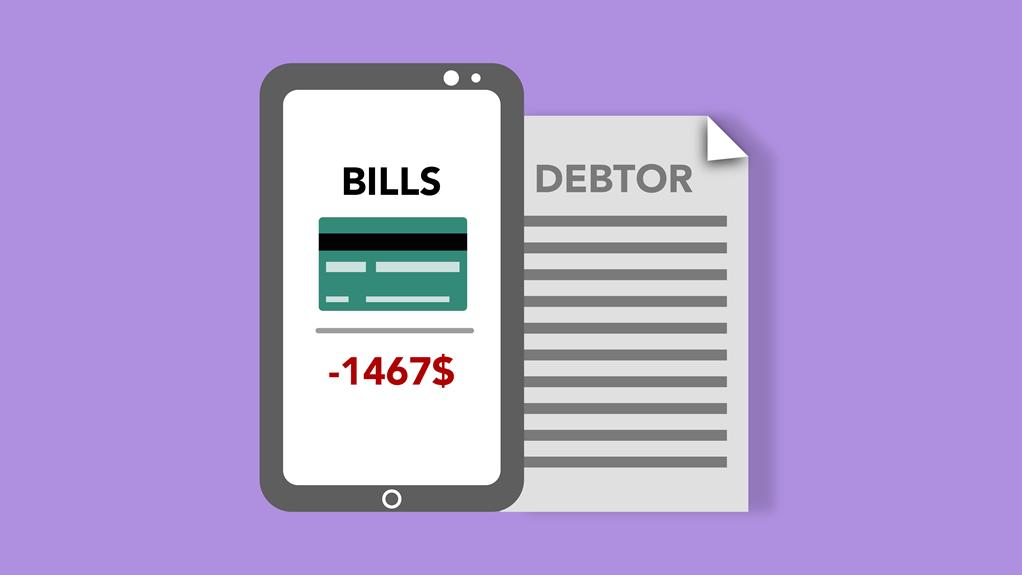Millions Settled in Credit Report Lawsuits
As per recent legal trends, inaccuracies in credit reporting have sparked a surge in lawsuits, culminating in multi-million-dollar settlements. Credit reporting agencies, banks, and debt collectors are being held accountable for errors that cause significant damage to consumers. This article explores these lawsuits, including the landmark $45 million settlement against major credit reporting agencies for erroneous bankruptcy reporting, and provides crucial information on free consultations and potential compensation.

Overview of Credit Report Lawsuits
How does one approach the issue of erroneous credit reports and what legal recourse is available for consumers who face such problems? Addressing common credit report errors begins with understanding the nature of these mistakes. They typically range from incorrect personal details to reporting outdated financial information. The impact of credit report mistakes can be far-reaching, affecting mortgage approvals, job applications, and housing requests. Legal recourse includes filing a lawsuit against credit reporting agencies or other entities responsible for inaccurate reporting. The Fair Credit Reporting Act (FCRA) protects consumers, allowing them to seek compensation for damages. Past lawsuits have seen substantial settlements, signaling to consumers that they have a robust legal avenue for redress.
Free Legal Consultation Availability
While having the right to seek legal recourse for credit report errors can be empowering, it's crucial to know that free legal consultation is readily available for those who may be overwhelmed by the process. These consultations play a vital role in determining eligibility for lawsuits and ensuring that potential litigants are well-informed about their rights.
| Availability of Legal Advice | Free Consultation | Determining Eligibility for Lawsuits |
|---|---|---|
| Legal advice is readily accessible | Consultations are provided free of charge | Assessment of the individual's case to check eligibility |
| Resource for understanding credit report lawsuits | Expert advice without financial burden | Guidance on potential for compensation |
| Empowers individuals to take action | Removes barriers to legal help | Clarifies the feasibility of a lawsuit |
Thus, free legal consultations are an indispensable resource in the fight against credit report inaccuracies.
Common Credit Report Problems
Identifying common credit report problems forms the initial step towards understanding potential grounds for litigation under the FCRA. These issues often include inaccuracies such as incorrect personal information, misreported account statuses, or outdated financial data. Common credit report errors can have severe consequences, impacting an individual's ability to secure loans, employment, or housing. The impact of credit report mistakes is not just personal; it extends to the broader economy, affecting lending practices and financial stability. Therefore, it's crucial to regularly review credit reports, identify errors, and take necessary steps to correct them. If these errors persist due to the negligence of credit reporting agencies, individuals may have grounds to initiate legal action, as evidenced by recent multi-million dollar settlements.
Impact of Credit Report Errors
Credit report errors can significantly weigh down on an individual's financial well-being, leading to a cascade of negative consequences. The impact of credit report errors can be far-reaching, affecting not only the ability to secure loans or credit cards but also potential employment opportunities and housing applications. This is because credit reports are often utilized to evaluate an individual's reliability and financial responsibility. Consequently, the consequences of inaccurate credit reporting can create a distorted image of an individual's creditworthiness, resulting in higher interest rates, loan denials, and even job rejections. Furthermore, these errors can be difficult and time-consuming to correct, causing additional stress and financial hardship. Therefore, it is crucial to regularly check and rectify any inaccuracies in credit reports.
Suing for Credit Reporting Mistakes
In the face of these damaging credit report inaccuracies, legal recourse emerges as a critical instrument for individuals to rectify the harm inflicted upon their financial reputation. The impact of credit report errors can be far-reaching, affecting everything from loan eligibility to employment opportunities. Filing a credit report lawsuit can offer a route to compensation, holding credit reporting agencies accountable for their mistakes. However, the process can be complex, often requiring expert legal guidance. Successful lawsuits against entities such as Experian, Equifax, and TransUnion have resulted in significant settlements, demonstrating the potential efficacy of this approach. Despite the challenges, for many suffering from the consequences of credit report inaccuracies, litigation may provide the most effective means of redress.
Potential Lawsuit Targets
While seeking legal recourse for credit report mistakes, it's essential to understand that potential targets for lawsuits can include not only credit reporting agencies like Experian, Equifax, and TransUnion, but also tenant screening companies, banks, and debt collectors. These entities are legally required to provide accurate credit information and failure to do so may result in them becoming lawsuit targets. Often, it's a complex process to identify responsible parties and holding them accountable. Therefore, proper legal consultation is crucial to navigate through these intricacies. Attorneys specializing in credit report lawsuits can provide crucial guidance, help in identifying potential lawsuit targets, and advise on the probability of succeeding in a lawsuit, ensuring the victims of credit report errors can effectively seek justice.
Compensation From Successful Lawsuits
Following successful litigation against entities responsible for credit report errors, the compensation awarded can be substantial, often reaching up to $1,000, in addition to attorney fees and costs. The compensation calculation generally takes into account the gravity of the error and the impact on the plaintiff's financial welfare.
Here is a representation of some successful lawsuit scenarios:
| Case | Compensation | Legal Representation |
|---|---|---|
| Experian Error | $5,000 | Law Firm A |
| Equifax Misreport | $7,000 | Law Firm B |
| TransUnion Mistake | $6,000 | Law Firm C |
| Bank Error | $4,000 | Law Firm D |
| Debt Collector Violation | $8,000 | Law Firm E |
Exploring legal representation options is crucial in navigating these lawsuits and ensuring rightful compensation.
Experian, Trans Union, and Equifax Settlement
Continuing our exploration, we now turn our focus to the major settlements involving credit reporting giants Experian, Trans Union, and Equifax. These settlements were sparked by the impact of credit report errors, which demonstrated violations of the Fair Credit Reporting Act. The most notable among these was the Experian settlement, where the company paid $45 million for inaccurately reporting debts discharged in bankruptcy. These errors had significant, damaging effects on consumers, affecting their eligibility for loans, employment, and housing. The settlements underscore the importance of accuracy in credit reporting and serve as a stern reminder to these agencies about their legal obligations. They also highlight the available legal recourse for consumers affected by such errors.
JPMorgan Chase Customers' Settlement
In a notable case, $8.75 million was awarded to former JPMorgan Chase customers whose credit reports were improperly pulled after they had terminated their relationship with the bank. This settlement significantly highlighted the impact of JPMorgan Chase's settlement on the banking industry, underscoring the importance of adhering to consumer credit reporting regulations. The process of filing a lawsuit for credit report errors can be complex, therefore, affected customers were guided by legal professionals throughout the process. The outcome served as a strong reminder to other institutions about the potential repercussions of negligent practices. This case further emphasized the importance of thorough checks and balances in the banking sector, to uphold consumers' rights and maintain trust in financial institutions.
Experian's FCRA Violation Settlement
Amid these notable cases of credit report lawsuits, the $8 million settlement against Experian stands out for its violation of the Fair Credit Reporting Act (FCRA). This case was not only a result of FCRA violations but also stemmed from Experian's data breach settlement, which involved millions of consumers' information. The impact of credit report errors on employment opportunities cannot be overstated. Incorrect information can lead to unjust employment denials, affecting consumers' livelihoods. In this landmark settlement, Experian was held accountable for its transgressions, demonstrating the seriousness of FCRA violations. The case serves as a cautionary tale for other credit reporting agencies and underscores the importance of stringent data management and accurate credit reporting.
Consultation With lawsuitlegit.com
Offering free consultations, lawsuitlegit.com provides a valuable resource for individuals experiencing credit report errors and considering legal action. This platform assists them in assessing the impact of credit report errors on their financial credibility and personal lives. By connecting with experienced attorneys, individuals can gain insight into the complexities of their case and understand potential compensation they might be entitled to. The personalized interaction allows for a comprehensive evaluation of the case, helping individuals decide if pursuing legal action is in their best interest. The attorneys can also guide them on how to initiate a lawsuit against entities responsible for the errors. lawsuitlegit.com's consultation service thus plays a crucial role in empowering individuals to claim their rights and rectify credit report inaccuracies.
Understanding Potential Compensation
Navigating through the intricacies of credit report lawsuits, individuals often question the potential compensation they might be entitled to as a result of successful litigation. Understanding compensation options is crucial to make an informed decision about pursuing a case. Compensation can vary, but successful lawsuits may result in settlements up to $1,000, in addition to attorney fees and costs. The legal rights for credit report errors also permit victims to seek punitive damages, typically awarded in cases of gross negligence. Moreover, victims may be entitled to recover any actual damages suffered, such as loss of credit or employment opportunities. Therefore, it's essential to comprehend these potential compensations when considering legal recourse for credit report errors.
Filing a Credit Report Lawsuit
One must understand the process of filing a credit report lawsuit to effectively seek justice for errors that have negatively impacted their financial situation. The filing process starts with acquiring appropriate legal representation to navigate the complexities of the law. This representation will help in identifying the faulty parties, which can include credit reporting agencies, banks, or debt collectors. They will also guide you in gathering necessary evidence to prove the inaccuracies in your credit report. Once prepared, your legal team will file the lawsuit on your behalf. It's crucial to remember that the outcome of these lawsuits can't be guaranteed. However, with the right legal support, you increase your chances of successfully challenging the errors and obtaining rightful compensation.
Contacting lawsuitlegit.com Attorneys
If you've decided to challenge the errors in your credit report, reaching out to the attorneys at lawsuitlegit.com should be your next step. Specializing in credit report lawsuits, they provide comprehensive legal action assistance, helping you navigate the complexities of the legal process. Consulting with lawyers from lawsuitlegit.com can give you a clear understanding of your rights and potential remedies. The attorneys are equipped to evaluate your case, explain the compensation you may be entitled to, and guide you through the process of filing a lawsuit. This free consultation imposes no obligation to proceed with legal action. To initiate a consultation, simply fill out the form on their website. Remember, your journey towards credit report accuracy and justice can start with a simple conversation.
Staying Updated With Lawsuit News
Keeping abreast of the latest developments in credit report lawsuits is crucial for those who seek to understand the changing landscape of credit reporting litigation. The impact of credit report errors can be disastrous, leading to denials of loans, jobs, and housing opportunities.
To stay informed, consider the following:
- Regularly check your credit report for inaccuracies.
- Stay updated on news regarding credit reporting errors and related lawsuits.
- Understand who the potential lawsuit targets are, including credit reporting agencies, banks, and debt collectors.
- If you spot an error, take immediate action to correct it.
Frequently Asked Questions
What Are the Steps to Take Before Filing a Lawsuit for a Credit Reporting Error?
To address a credit reporting error, begin with error prevention by regularly reviewing your credit reports for inaccuracies. If an error is found, verify your identity and dispute it with the credit reporting agency. Document all communication for evidence. If the error is not rectified, consult with a lawyer specializing in Fair Credit Reporting Act violations. They can guide you through the process of filing a lawsuit to correct the error and potentially receive compensation.
Can a Person Sue for Credit Report Errors if They Live Outside of the United States?
Yes, individuals residing outside the United States can potentially sue for credit report errors under certain circumstances. This is due to principles of international jurisdiction, which may allow for legal action against entities responsible for error accountability. However, the specific legal process and likelihood of success can depend on various factors, including the nature of the error, the entity responsible, and the laws applicable in both the individual's home country and the United States.
What Other Types of Compensation Can Be Sought Aside From Monetary Damages?
In the legal arena, not all victories are measured in dollars and cents. Non-monetary remedies, such as injunctions or corrective actions, can be sought in credit report lawsuits. These can compel agencies to correct errors or change their practices. Additionally, compensation for emotional distress can be claimed, which recognizes the mental anguish caused by credit report inaccuracies. This broadens the scope for claimants, allowing them to seek justice beyond purely financial terms.
How Long Does a Typical Credit Report Lawsuit Process Take?
The duration of a credit report lawsuit process can vary widely, often taking several months to a few years. This timeline depends on factors such as the complexity of the case and court schedules. Lawsuit preparation, including gathering evidence and negotiating settlements, can be lengthy. Additionally, the emotional impact on the plaintiffs during this period can be significant, as they await resolution of their credit issues.
Are There Any Other Legal Implications or Consequences of Filing a Credit Report Lawsuit?
Filing a credit report lawsuit can be like navigating treacherous waters. Lawsuit impacts may include potential reputational risks and financial consequences if unsuccessful. It could also affect your future credit report. Legal preparations are crucial to mitigate these risks, involving gathering sufficient relevant evidence and seeking expert legal advice. However, successful lawsuits can result in compensation and correction of the error, hence, potentially improving your credit score. Be aware of the potential implications before embarking on this legal journey.

This post has been generated by AI and was not reviewed by editors. This is Not legal advice. Please consult with an attorney.




